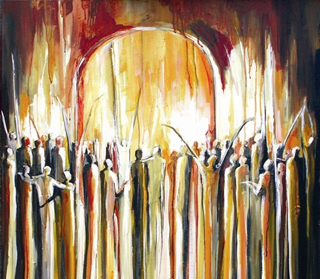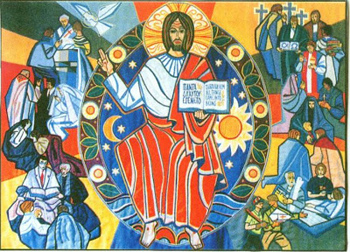For Sunday November 21, 2021
Lectionary Readings (Revised Common Lectionary, Year B)
2 Samuel 23:1-7
Psalm 132:1-18
Revelation 1:4b-8
John 18:33-37
At this point, it has become a cliché to say we live in a "post-truth" era. We don’t have to dig deep to find the headlines that affirm this grim reality. Whether we're talking about politics, climate change, the Covid-19 pandemic, or critical race theory, a quick Google search will yield zingers like, “The Death of Truth,” “The Assault on Truth,” “Notes on Falsehood,” and “Our Post-Truth World.” We are steeped in a culture of blatant lies, sly exaggerations, doctored images, wild conspiracy theories, and fake news. Objective facts, for all intents and purposes, no longer exist or matter. The true is false, the false is true, and anything can mean anything.
What does this sobering reality have to do with the lectionary? Well, this week the church celebrates the Reign of Christ, a liturgical hinge between the long “Season After Pentecost,” and the beginning of Advent. This week we pause to reflect on the meaning of Christ's reign over the church, the world, and our lives. What kind of king is Jesus? What does his rule look and feel like? What does it mean to live under his kingship?
To guide our reflection for this climactic Sunday, the lectionary gives us a rather odd Gospel reading. Do we see Jesus in his kingly glory, transfigured and dazzling on a mountaintop? Do we watch him rise from the waters of baptism with heaven thundering in his ears? Do we witness one of his more spectacular miracles?
No, our king doesn't appear in any of those majestic guises. Instead, the Gospel of John offers us a picture of Jesus at his physical and emotional worst: arrested, disheveled, harassed, hungry, abandoned, sleep-deprived — and standing before the notoriously cruel Pontius Pilate for questioning. If I were going to write Jesus into a kingly scene, this would not be the one I’d write. But here's the astonishing reality: if there is any story about Jesus that can smack all smugness out of us — all arrogance, all gleefulness, all scorn — surely this one has to be it. This week, our king is an arrested, falsely accused criminal. A dead man walking. His chosen path to glory is humility, surrender, brokenness, and loss.
 |
But what does any of this have to do with our current crisis of truth and untruth? Consider the exchange that takes place between Jesus and Pilate: “Are you a king?” Pilate asks Jesus repeatedly, annoyed, perhaps, that a bedraggled peasant is taking up his valuable time on a tense and busy weekend in the city. “You say that I am a king,” Jesus answers cryptically, implying both that Pilate’s question is the wrong one, and that Pilate’s assumptions about power and kingship are irrelevant to the ways of God. Then Jesus continues: “For this I came into the world, to testify to the truth. Everyone who belongs to the truth listens to my voice.”
Pilate’s response echoes down to us across the ages, a question to end all questions: “What is truth?” We’ll never know if he asks out of contempt or curiosity, hunger or anger. But it doesn’t matter; Jesus doesn’t respond. That is, he doesn’t respond with words. He doesn’t engage Pilate in a philosophical dialogue, or offer the governor a pithy bumper sticker. Instead, he embodies his reply with the whole of his life: “You’re looking at it,” his silence implies. “You’re looking at the truth. I am the truth." In other words, truth isn’t an instrument, a weapon, or a slogan we can smack on a refrigerator magnet. The truth is Jesus. The life of Jesus, the way of Jesus, the love of Jesus. He himself is truth's most complete and complex embodiment.
What does it mean, in our post-truth era, to worship the King of Truth? What does it mean to “belong to the truth” in a culture that increasingly denies truth’s validity? Perhaps most importantly, how can we bear witness to embodied truth, complex truth, truth-as-a-story-of-birth-and-life-and-death-and-resurrection, in a world that prefers soundbites, Tweets, and clever New Yorker cartoons?
 |
As I reflect on this Gospel passage, it seems to me that one of the most urgent tasks facing the church on this “Christ the King” Sunday is forging a robust, urgent, gracious, and trustworthy relationship to the truth. If Jesus came to testify to the truth, if he is the truth, if he is the king of truth, then what do we, his subjects, owe our king? What does loyalty to truth look like?
Well, if truth is king, then “fake news” is not. If truth is king, then self-deception (however expedient or attractive) is not. If truth is king, then lazy relativism is not. If truth is king, then distorting inconvenient facts for our own political, racial, social, cultural, religious, or economic comfort, is not.
Even as I type these words, I’m aware of the church’s long and shameful tradition of using “the truth” to consolidate and abuse its own power. Too often, we have excelled at using “truth” to colonize, enslave, reject, and dehumanize those we conveniently call our “Others."
But that’s not the kind of truth Jesus calls us to belong to. The truth he embodies in his life, death, and resurrection is not instrumental or self-aggrandizing in any way. It does not serve to bolster his own power and authority. Quite the opposite — it humbles him. It empties him. It takes away his life.
 |
As far as I can tell, Jesus doesn’t privilege any version of truth that sidesteps humility, surrender, and sacrificial love. He doesn’t secure his own prosperity at the expense of other people’s suffering. He doesn’t allow holy ends to justify debased means. He doesn’t make honesty optional when the truth strikes him as inconvenient. And he never aligns himself with brute, dishonest power to guarantee his own success.
This is our king. Can we stand for the truth as he does? Can we belong to the truth as he does? Can we tell and keep telling the beautiful, hard, cutting, joy-filled, pain-filled, powerfully undeniable stories we know to be true about this Jesus, this Gospel Jesus whose very identity is truth, and whose best expression of power is surrender?
Soon, we will enter into Advent, a season of waiting, longing, and listening. Soon we will walk into the expectant darkness, waiting for the light to dawn, for the truth to reveal itself, for the first cries of a vulnerable baby to redefine kingship, authority, and power forever. Yes, we have good reasons to fear the erosion of truth. But we are not a people bereft of hope. The king who reigns will not abandon us. Truth will survive; it has died and returned to life already. The truth lives. And we belong to him.
Debie Thomas: debie.thomas1@gmail.com
Image credits: (1) ww.stevesevy.com; (2) Life and Liberty Online; and (3) Patrick Comerford.





